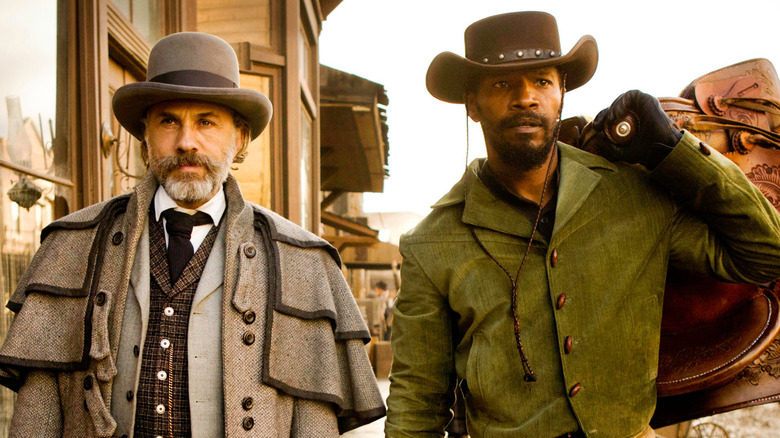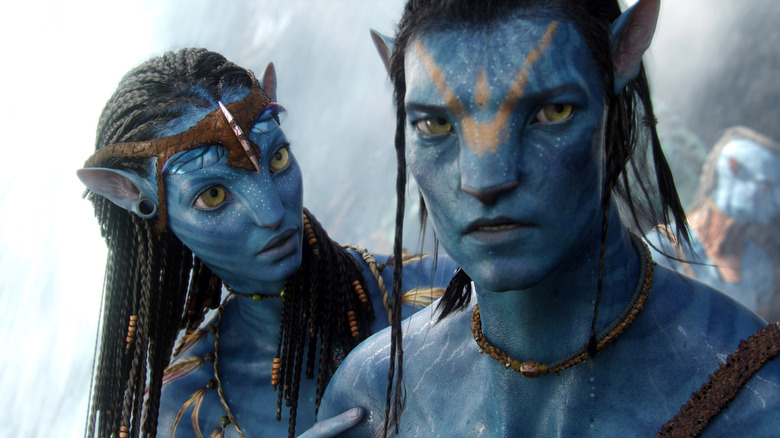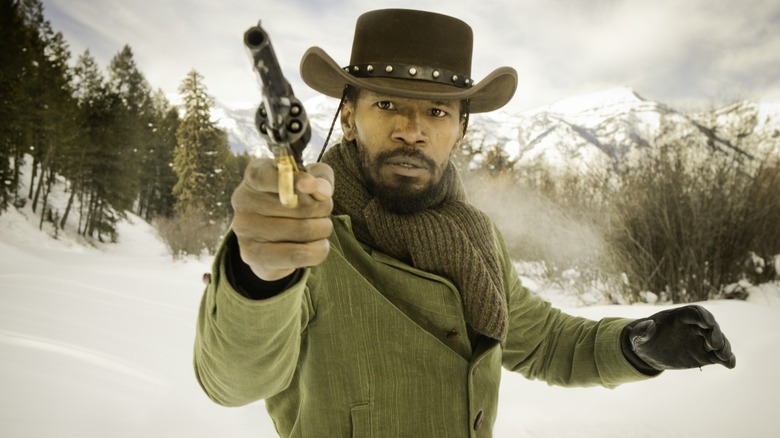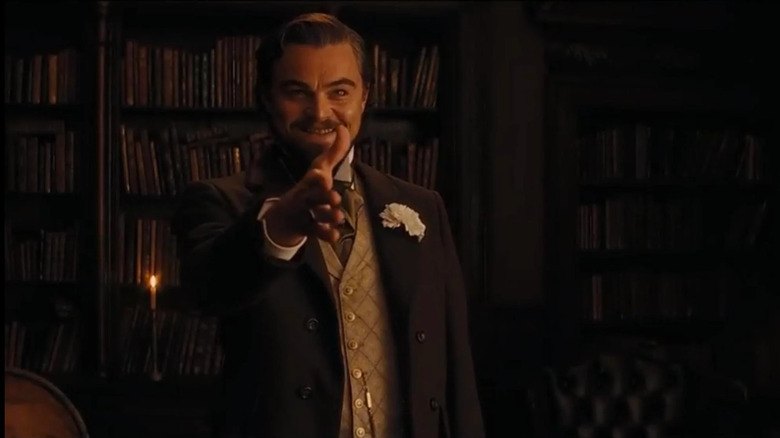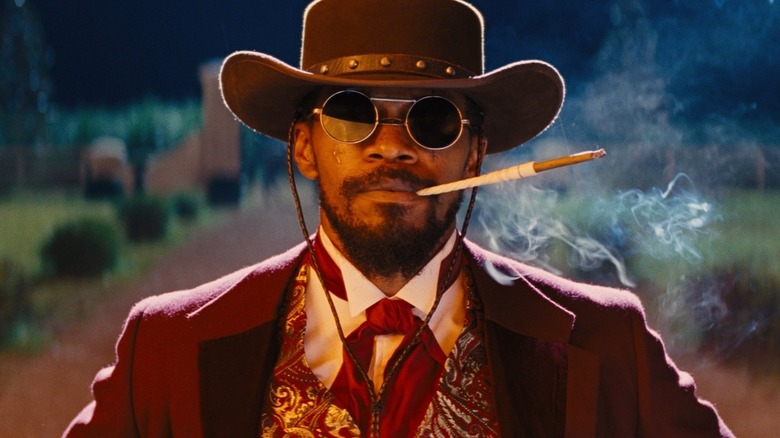Django Unchained Ending Explained: Subverting That White Savior Trope
"Django Unchained" isn't typically placed on the top of the list of people's favorite Quentin Tarantino films. If you're looking for a good old satisfying revenge flick, people are more likely to point to "Kill Bill" or "Inglourious Basterds" instead. As for "Unchained," it's common to hear critics refer to it as "a mixed bag," and they're certainly onto something there. As one critic put it: "The good moments are really good, but each of them are bookended by one questionable narrative choice or a blast of QT style that doesn't always help the film as a whole." In other words: the film's a little too self-indulgent.
Perhaps the part of the movie most accused of indulgence is the ending. After Schultz (Christoph Waltz) and Candie (Leonardo DiCaprio) are killed and Django (Jamie Foxx) is captured, there's an extended final act in which Django is brought back into slavery again, escapes again, and returns to the plantation to the finish the job he and Schultz set out to do.
For a movie that's 2 hours and 45 minutes long, people often wonder what the point of that last half hour was. We've already had the big, climactic shootout, so why is the movie still going? It's satisfying to watch Django kill a bunch of slaveowners and rescue his wife, but why the detour? Why wouldn't Tarantino have written it so that Django shoots his way out of the situation, instead of the version we got where Django essentially shoots his way to victory twice instead?
It all comes down to that white savior trope
The white savior trope is that thing where a fictional story about a marginalized group, be it in a historical setting or a fantasy/sci-fi one, will typically feature at least one white character who is not racist like the others, who seems designed to prevent the movie from making white audiences feel too uncomfortable.
Even at its best, movies that make use of the trope often feel condescending. "Avatar," for example, is a Native American allegory that clearly takes the natives' side, but it's still one that centers around a white guy who manages to figure out the natives' entire culture and become their leader within a few months. The most egregious moment is probably when he gains the respect of all the Na'vi by successfully taming a Toruk Makto (the giant scary bird creature) simply by jumping on it from above, which somehow none of the Na'vi have managed to figure out throughout their entire civilization.
Despite "Avatar" being well-meaning, the relative ease with which Jake Sully takes leadership of Na'vi (not to mention the ease to which he's forgiven of his early betrayal) makes the whole species seem childish, passive, and too simplistic to feel like fully realized people.
Is Django Unchained a white savior movie?
For the first two thirds of the movie, it certainly seems to be. Schultz frees Django from slavery, takes him under his wing and teaches him everything he knows. In a movie where nearly every white person is horribly racist, Schultz is the one good white guy with relatively modern sensibilities. He despises slavery and sees the cruelty of the slaveowners for what it is. For white viewers, he's a comforting figure; we like to think that if we were alive in this time and place, we'd be more like him than someone like Candie.
If Django had successfully shot his way out of the Candyland plantation the first time around, this would be a clear-cut case of the white savior trope. Django might get a happy ending, but it would almost all be thanks to Schultz himself. After all, Schultz is the one who gave Django his gun, his clothes, his ability to read, and the opportunity to discover how good he was at shooting.
There are a lot of problems with the white savior trope, but maybe the biggest is how it can undermine the agency of the marginalized people the movie's supposedly advocating for. Django self-actualizes a lot throughout the first two hours of the movie, but it's a little undermined by the fact that it's all the result of Schultz's guidance.
Just shake the guy's hand, Schultz
Before the first big shootout, Schultz and Django have basically achieved their goal: they've successfully rescued Broomhilda (Kerry Washington) and are on their way to peacefully leave the place. The only problem is that this costs a lot of Schultz's pride; Candie figured out what they were doing and forced him to pay an exorbitant $12,000 for her. Then, in a movie that's clearly about humiliating Schultz and asserting dominance over him, Candie demands Schultz shake his hand.
Obviously, the smart thing to do at this point is just shake Candie's hand, but Schultz is disgusted by the guy. The idea of being forced to shake his hand is the most repulsive, shameful thing he can imagine, but Candie says he won't allow them to leave with Broomhilda unless Schultz does it. What happens next is a moment where Schultz's actions make perfect emotional sense while also being one of the dumbest things he can possibly do: he shoots Candie point-blank in front of everyone.
It's satisfying to see the evil, smug Candie finally getting taken down for good, but of course we're immediately reminded that this isn't worth it. Schultz gets shot down, and now Django is left to fend for himself. Everything they've worked for has been ruined within the span of a few seconds.
By this point, Schultz has thoroughly disavowed his role as a white savior archetype. Yes, he may have saved Django in the beginning and helped him along this whole time, but his final act alive is to screw him over worse than nearly anyone else in the movie.
Django, fully unchained
Schultz's last words to Django are, "I'm sorry, I couldn't resist," words that are somehow both badass and revelatory of just how selfish Schultz is. Because Schultz can't get his emotions under control, something the Black characters in this movie have spent a lifetime having to do, he's basically resigned Django to death and Broomhilda back to a life of slavery. He is the opposite of what a savior's supposed to be.
This is part of why Django's first shootout ends with him getting recaptured: there need to be some real, negative consequences for Schultz's decision here. If Django successfully shot his way out of there — as he nearly seemed capable of doing — then the movie wouldn't really be condemning Schultz's choice. The selfishness of his decision wouldn't fully be felt.
It's also important for Django to be recaptured because now, when he escapes slavery a second time, he gets to do it entirely on his own. With nothing left but his own cunning and confidence, Django breaks out of slavery, kills the rest of Candy's people, and rescues Broomhilda once and for all, and he does it without any sort of white mentor helping him out. At this point he's entirely his own man, not acting on anyone's behalf but his own.
"Django Unchained" is basically a superhero origin story for a man whose superpower is being really good with guns. With any superhero story, the mentor needs to be written out before the final act so that the hero can reach his full potential through his own inner strength, not through outside help. The final half-hour of "Unchained" might seem a little strangely paced, but it's absolutely vital for the story the movie's trying to tell.
